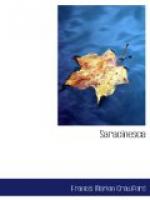Speaking broadly, there is no one at once so thoroughly Roman and so thoroughly non-Roman as the Roman noble. This is no paradox, no play on words. Roman nobles are Roman by education and tradition; by blood they are almost cosmopolitans. The practice of intermarrying with the great families of the rest of Europe is so general as to be almost a rule. One Roman prince is an English peer; most of the Roman princes are grandees of Spain; many of them have married daughters of great French houses, of reigning German princes, of ex-kings and ex-queens. In one princely house alone are found the following combinations: There are three brothers: the eldest married first the daughter of a great English peer, and secondly the daughter of an even greater peer of Prance; the second brother married first a German “serene highness,” and secondly the daughter of a great Hungarian noble; the third brother married the daughter of a French house of royal Stuart descent. This is no solitary instance. A score of families might be cited who, by constant foreign marriages, have almost eliminated from their blood the original Italian element; and this great intermixture of races may account for the strangely un-Italian types that are found among them, for the undying vitality which seems to animate races already a thousand years old, and above all, for a very remarkable cosmopolitanism which pervades Roman society. A set of people whose near relations are socially prominent in every capital of Europe, could hardly be expected to have anything provincial about them in appearance or manners; still less can they be considered to be types of their own nation. And yet such is the force of tradition, of the patriarchal family life, of the early surroundings in which are placed these children of a mixed race, that they acquire from their earliest years the unmistakable outward manner of Romans, the broad Roman speech, and a sort of clannish and federative spirit which has not its like in the same class anywhere in Europe. They grow up together, go to school together, go together into the world, and together discuss all the social affairs of their native city. Not a house is bought or sold, not a hundred francs won at ecarte, not a marriage contract made, without being duly considered and commented upon by the whole of society. And yet, though there is much gossip, there is little scandal; there was even less twenty years ago than there is now—not, perhaps, because the increment of people attracted to the new capital have had any bad influence, but simply because the city has grown much larger, and in some respects has outgrown a certain simplicity of manners it once possessed, and which was its chief safeguard. For, in spite of a vast number of writers of all nations who have attempted to describe Italian life, and who, from an imperfect acquaintance with the people, have fallen into the error of supposing them to live perpetually in a highly complicated state of mind, the foundation




